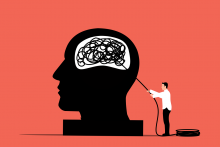Recent research has shown that a large portion of students at the University of Twente experience mental health problems. According to a large-scale study from 2019, 80 percent of UT students suffers from stress, depression or anxiety issues; and students’ well-being was further hit by the coronacrisis.
This prompted the idea for an intervention that tackles these issues early on, explains Ed de Bruin, assistant professor at the Department of Psychology, Health and Technology. He co-developed a special four-week long course for students, aiming to decrease their stress levels and improve their well-being.
What does the course look like?
De Bruin: ‘It is an online well-being course called Personal reflection, positive psychology and meditation. It consists of four weekly minilectures, and four weekly live-sessions. The course was set up on Canvas so that people could follow it easily and fit it into their schedule, with weekly live sessions to support the online lectures. Our pilot has revealed that in-person sessions boost the impacts of the digital course, and so now we plan to emphasize the live sessions more.’
What themes or techniques are covered in the course?
‘We cover themes such as personal values and passions, well-being and potential challenges, resilience, stress mindset and so on. Students often get overwhelmed by the study and they lose sight of why they started studying in the first place. Reminding them of their passion helps them to find meaning, which in turn can help decrease stress and improve their resilience. You can also look at stress as something that drives you. But of course you can’t just tell someone to change their mindset, they need to do exercises and practice. In the course we also teach mindfulness and autobiographical techniques, for instance. It should be very hands on and give students methods to choose from.’
Who would you recommend this course to?
‘I think most students can benefit from it. It covers very fundamental human skills. We usually focus on time management skills and fulfilling tasks, but we don’t often focus on emotional management. But having these skills sets people up for a more resilient life. If you break up with a partner, have difficulties in your study progress, or have to move to a completely new area, it takes an emotional toll on you. Provide yourself with skills that will help you through it.’
When and how did the course originate?
‘We were approached by colleagues working on the UT Student Well-being Improvement Programme (SWIP). They started early 2020 with a one-year project which is now turned into a longer running programme. Training and education of students is one of the elements of this programme. Marjolein and I had hands-on experience with mindfulness trainings, personal development courses and related research in our master-track. At the start of 2021 we began putting together the new course and we ran the first pilot with Psychology students in the spring.’
How was the pilot received?
‘Very well. The course had a good effect on the participants’ wellbeing. We ran a study and it showed that the course significantly reduced perceived stress and increased well-being. In interviews with a subgroup, participants rated the course overall with an 8.3 out of 10.’
What are the next steps?
‘This year the course should become available to mechanical engineering students and we are looking into how to implement the course more broadly at the UT. Ultimately we want the course to be integrated in all UT educational programmes. We have also started the process of developing a Minor on Well-Being, but we are still at very early stages of that.’







